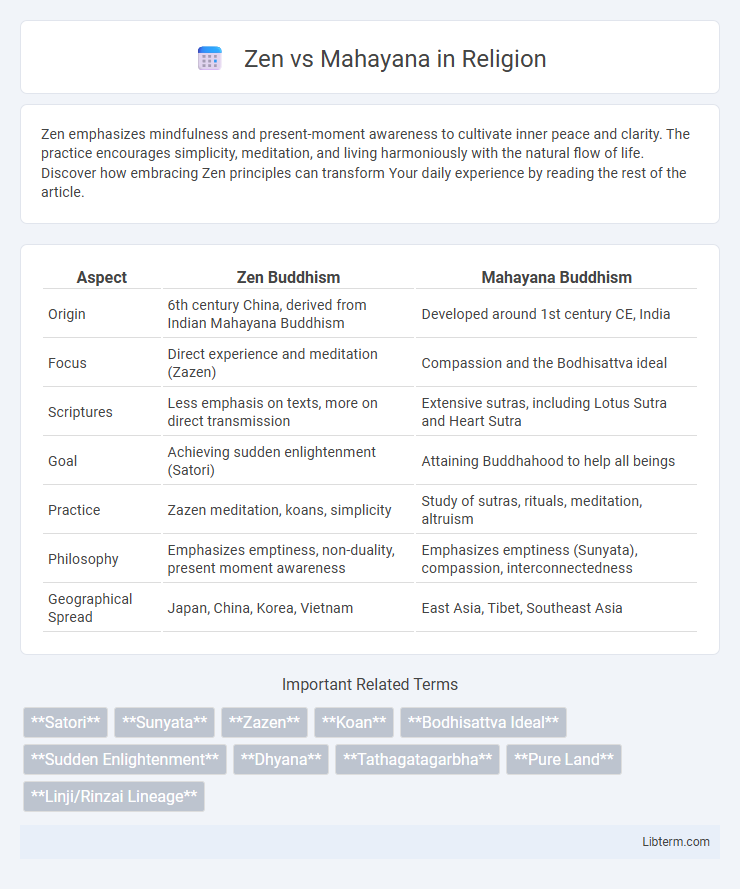Zen emphasizes mindfulness and present-moment awareness to cultivate inner peace and clarity. The practice encourages simplicity, meditation, and living harmoniously with the natural flow of life. Discover how embracing Zen principles can transform Your daily experience by reading the rest of the article.
Table of Comparison
| Aspect | Zen Buddhism | Mahayana Buddhism |
|---|---|---|
| Origin | 6th century China, derived from Indian Mahayana Buddhism | Developed around 1st century CE, India |
| Focus | Direct experience and meditation (Zazen) | Compassion and the Bodhisattva ideal |
| Scriptures | Less emphasis on texts, more on direct transmission | Extensive sutras, including Lotus Sutra and Heart Sutra |
| Goal | Achieving sudden enlightenment (Satori) | Attaining Buddhahood to help all beings |
| Practice | Zazen meditation, koans, simplicity | Study of sutras, rituals, meditation, altruism |
| Philosophy | Emphasizes emptiness, non-duality, present moment awareness | Emphasizes emptiness (Sunyata), compassion, interconnectedness |
| Geographical Spread | Japan, China, Korea, Vietnam | East Asia, Tibet, Southeast Asia |
Introduction to Zen and Mahayana Buddhism
Zen Buddhism emphasizes direct experience and meditation (zazen) as the path to enlightenment, originating from the Mahayana tradition, which highlights the bodhisattva ideal of compassion and enlightenment for all beings. Mahayana Buddhism encompasses a broad range of teachings and scriptures, stressing the importance of wisdom (prajna) and skillful means (upaya) to transcend suffering. Both share foundational concepts like emptiness (shunyata) and the pursuit of enlightenment but differ in practices and philosophical emphasis.
Historical Origins of Zen and Mahayana
Zen Buddhism originated in China during the Tang Dynasty (618-907 CE) as Chan Buddhism, heavily influenced by Mahayana teachings and Chinese Taoism. Mahayana Buddhism emerged earlier, around the 1st century CE in India, emphasizing the bodhisattva ideal and the pursuit of enlightenment for all beings. The historical development of Zen is deeply rooted in Mahayana philosophy, adapting its principles into a meditation-focused practice that later spread to Japan and other East Asian regions.
Core Philosophical Differences
Zen emphasizes direct experience and meditation (zazen) as the path to enlightenment, prioritizing intuitive understanding over doctrinal study. Mahayana Buddhism, encompassing diverse schools, highlights the bodhisattva ideal, stressing compassion and the vow to attain enlightenment for the sake of all beings. Zen's minimalist approach contrasts with Mahayana's rich doctrinal texts and ritual practices, reflecting differing emphases on practice versus philosophy.
Key Practices in Zen Buddhism
Zen Buddhism emphasizes meditation (zazen) as the core practice, fostering direct experiential insight into one's true nature. Koan study, involving paradoxical questions or statements, develops intuitive understanding beyond rational thought. These practices contrast with Mahayana's broader ritual, devotional, and philosophical approaches, highlighting Zen's focused discipline on immediate awareness and enlightenment.
Central Teachings of Mahayana Buddhism
Mahayana Buddhism centers on the concept of the Bodhisattva ideal, emphasizing compassion and the pursuit of enlightenment not only for oneself but for all sentient beings. It advocates the doctrine of emptiness (Sunyata), which teaches that all phenomena are interdependent and lack intrinsic existence. Zen, a prominent branch of Mahayana, highlights direct experiential realization through meditation (zazen) and intuitive insight over scriptural study.
The Role of Meditation in Zen and Mahayana
Zen Buddhism emphasizes seated meditation (zazen) as the direct path to enlightenment, focusing on silent awareness and mindfulness to transcend conceptual thought. Mahayana Buddhism incorporates a variety of meditative practices, including visualization, chanting, and contemplation, aiming to cultivate compassion and bodhisattva qualities alongside insight. Meditation in both traditions serves as a vital tool for spiritual awakening, but Zen prioritizes immediate experiential realization while Mahayana integrates meditation within a broader doctrinal framework.
Enlightenment: Zen vs Mahayana Perspectives
Zen emphasizes direct experience and spontaneous insight as the path to enlightenment, often through meditation (zazen) and koans that challenge conceptual thinking. Mahayana Buddhism broadly views enlightenment as the realization of emptiness (sunyata) and the Bodhisattva ideal, involving compassion and wisdom cultivated across many lifetimes. Both traditions share the goal of awakening but differ in practices and interpretations of the enlightenment process.
Monastic Life and Lay Participation
Zen Buddhism emphasizes rigorous monastic discipline with long meditation sessions and strict adherence to koan study, fostering deep insight through direct experience. Mahayana traditions, while maintaining monastic communities, encourage greater lay participation in rituals, teachings, and merit-making practices, promoting a more integrated spiritual life for both monks and lay followers. The balance between monastic strictness and active lay engagement distinguishes Zen's contemplative focus from Mahayana's inclusive devotional approach.
Influence on Modern Spirituality
Zen Buddhism's emphasis on direct experience and meditation profoundly shapes modern spirituality by promoting mindfulness and inner peace without reliance on dogma. Mahayana Buddhism's expansive teachings on compassion, the Bodhisattva ideal, and interconnectedness inspire contemporary spiritual practices focused on altruism and universal harmony. Both traditions influence modern spiritual movements by encouraging personal awakening and ethical living in diverse cultural contexts.
Conclusion: Choosing Between Zen and Mahayana
Choosing between Zen and Mahayana depends on individual spiritual goals and preferences. Zen emphasizes direct meditation experience and simplicity, fostering personal insight through zazen practice. Mahayana offers a broader philosophical framework with diverse sutras and compassionate ideals, appealing to those seeking both intellectual study and altruistic practice.
Zen Infographic

 libterm.com
libterm.com